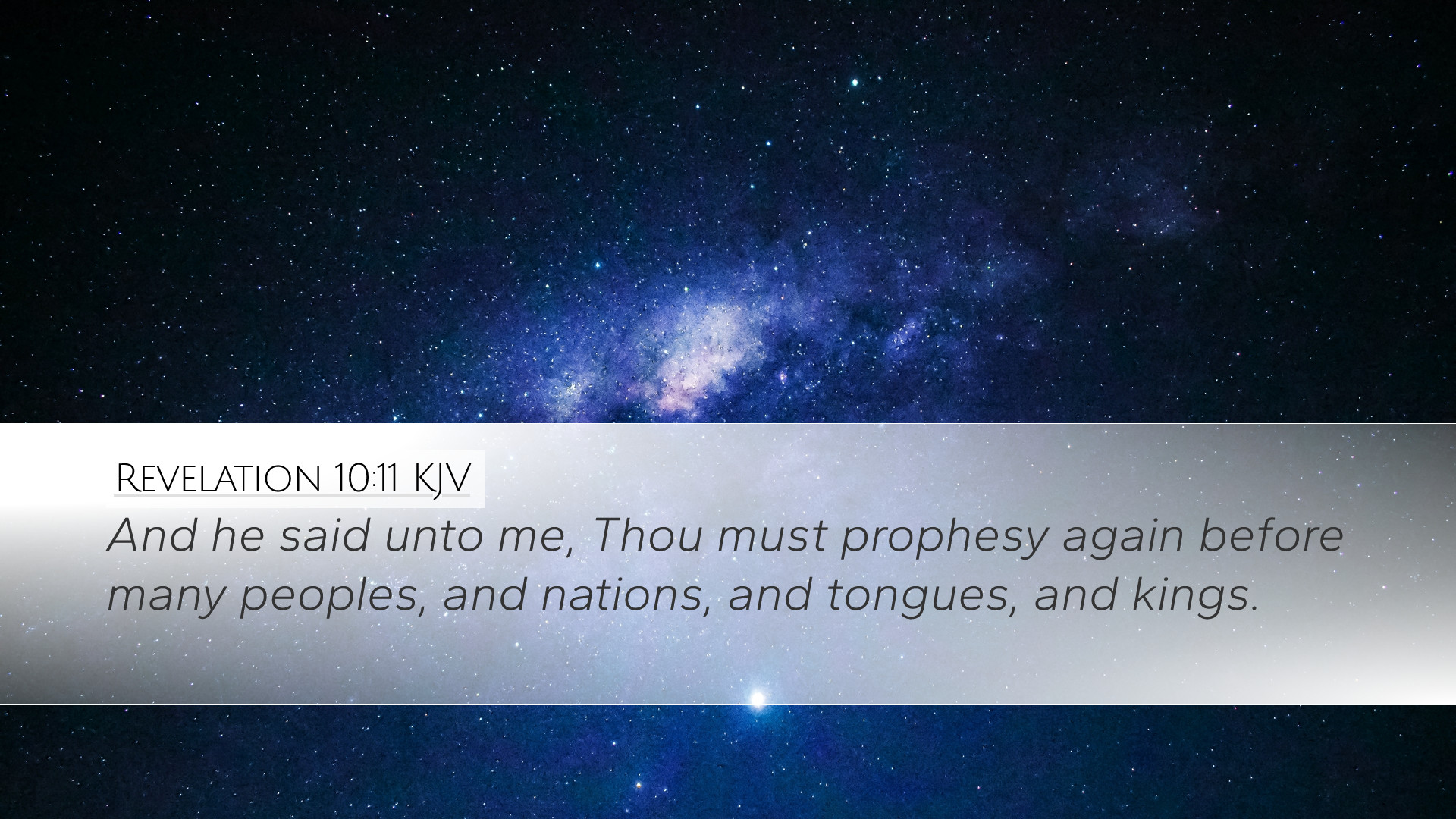Commentary on Revelation 10:11
Revelation 10:11 states, "And he said unto me, Thou must prophesy again before many peoples, and nations, and tongues, and kings." This verse encapsulates significant themes in the Book of Revelation, particularly concerning the role of prophecy and the ongoing mission of God's messengers. Below, we explore insights from various public domain commentaries to provide a comprehensive understanding of this scripture.
Contextual Overview
The context of Revelation 10 is pivotal as it marks an interlude in the sequence of judgments. The chapter presents a mighty angel delivering a message to John, indicating the importance of his prophetic role. This particular verse emphasizes the necessity of continuing to proclaim God's Word across various nations and demographics.
Matthew Henry's Commentary
Matthew Henry elucidates that this command signifies the ongoing responsibility laid upon the prophet. He notes that the call to prophesy again indicates that the work of proclamation is never finished. Henry asserts that this command reminds believers that the message of God must be communicated ceaselessly to all people.
- Universal Audience: The mention of "many peoples, and nations, and tongues, and kings" highlights the scope of the proclamation. It underscores the gospel's universal reach, suggesting that God's message transcends cultural and linguistic barriers.
- Continuity of Prophecy: Henry emphasizes the necessity of fresh prophecy. The "again" suggests that previous prophetic messages have prepared the way, but new contexts necessitate new declarations of truth.
Albert Barnes' Notes
Albert Barnes provides a detailed analysis of the phrase "Thou must prophesy again." He argues that the term "prophesy" refers not only to foretelling future events but also entails forth-telling the truths of God. Barnes posits that this command reveals God's commitment to sustain His witness on Earth.
- Role of the Prophet: According to Barnes, the prophet is an intermediary, conveying divine revelations to humanity. This task is crucial as it affirms God's sovereignty and His desire for relationship with His creation.
- Multifaceted Proclamation: The prophecy is meant for a diverse audience, emphasizing that no group is exempt from God's call. This is a vital consideration for pastors and theologians today as they approach congregations with messages of hope and truth.
Adam Clarke's Commentary
Adam Clarke emphasizes the significance of the angel's message and suggests that John’s prophetic mission falls under the category of encouragement and warning to the nations of the world. Clarke notes that the diverse nations referenced indicate the universal nature of Christianity.
- Historical Perspective: Clarke reflects on the historical context where early Christians faced oppression. The verse serves as a reminder of their role in declaring the Gospel amid trials, a principle that resonates through time.
- Implications for Modern Believers: Clarke challenges contemporary believers to consider their role in bearing witness amidst adversity, mirroring the resilience of the early church as they engaged in their prophetic ministry.
Theological Reflections
The theological implications of Revelation 10:11 are profound. The verse encourages believers to recognize the ongoing nature of God's revelation to humanity through prophecy. Pastors and theologians should take note of several critical elements:
- God's Sovereignty: The affirmation that God commands prophecy indicates His active involvement in the world. This sovereignty should guide how ministers convey the Word, reminding them that their messages carry divine authority.
- Necessity of Proclamation: The command to proclaim again stresses the need for believers to engage actively in evangelism and education within their communities. Prophecy is not a one-time event but a continual journey of sharing God's truth.
Practical Applications
To make the insights from this verse actionable, the following applications are proposed:
- Engagement with Diverse Communities: Churches should aim to reach various demographics, understanding the cultural and linguistic barriers while providing contextualized teachings that resonate.
- Continual Learning and Teaching: The command to prophesy urges pastors and teachers to stay rooted in Scripture, ensuring they are equipped to address contemporary issues and provide relevant counsel to their congregations.
- Encouragement of Prophetic Voices: Modern believers should foster environments where new voices can arise, reflecting the diverse nature of the body of Christ and ensuring all have an opportunity to proclaim God's message.
Conclusion
In conclusion, Revelation 10:11 serves as a powerful reminder of the unending responsibility Christians have to prophesy God's truths before all nations and peoples. The combined insights from Matthew Henry, Albert Barnes, and Adam Clarke highlight the call to bear witness to the Gospel in a comprehensive manner. For pastors, students, theologians, and scholars, this verse not only encourages personal reflection on the nature of prophecy but also emphasizes a collective commitment to sharing the transformative message of Christ with the world.


